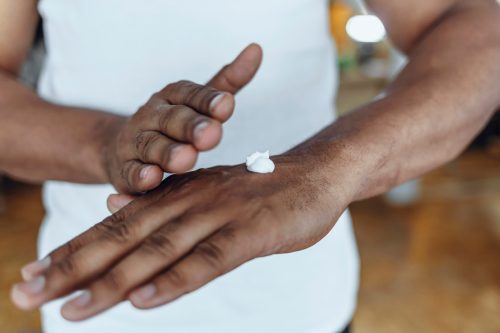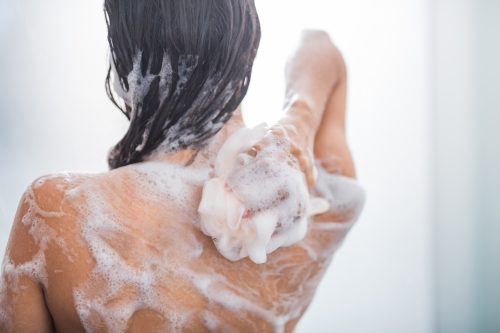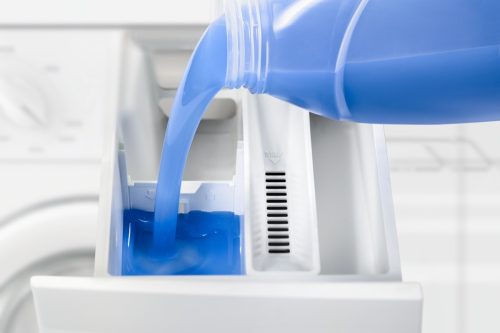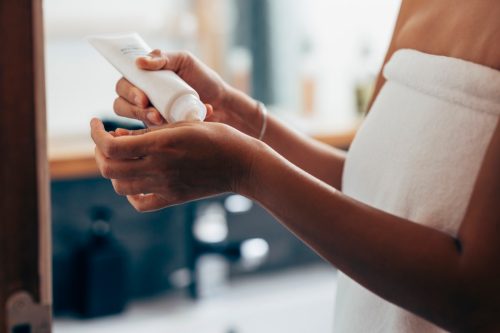7 Ways to Allergy-Proof Your Skin, According to Dermatologists

We spend all winter dreaming of the warm spring air, but when the season rolls around, reality quickly sets in. Pollen and other allergens can send our sinuses into overdrive, leaving us with runny noses and itchy throats. And that’s not all: Spring allergies can also wreak havoc on our skin, causing rashes, redness, irritation, dryness, puffiness, and more. Fortunately, there are things you can do to prep your body to fight against hay fever triggers—and we talked to several dermatologists to determine the best tricks and tips to do just that. Read on for seven ways you can allergy-proof your skin.
RELATED: 4 Best Supplements to Take for Allergies, According to Doctors.
1
Make sure to regularly moisturize.

Allergy-proofing your skin is all about “reducing contact with allergens and strengthening the skin’s natural barrier,” Anna Chacon, MD, a board-certified dermatologist based in Miami, tells Best Life.
One of the most effective ways to do this is to regularly moisturize your skin, according to Chacon.
“Moisturizers create a protective layer on the skin’s surface that can help shield it from allergens,” she explains. “They also keep the skin hydrated and healthy, reducing the likelihood of cracks that can allow allergens to penetrate.”
2
Keep your skin clean.

Another crucial step to protect your skin involves simply keeping it clean. Martin Smith, MD, double board-certified allergist-immunologist and co-founder of Untoxicated Skincare, recommends that those who suffer from hay fever try to rinse off in the shower right after they’ve spent any prolonged time outdoors.
“This washes off the allergens and adds much needed moisture to your skin,” he shares.
But don’t forget to watch out for the water temperature, too. Hot water can dry out your skin and make it less protective against allergens, so Smith says you should only shower in lukewarm or cold water.
RELATED: 5 Home Remedies for Seasonal Allergies That Actually Work.
3
Check the ingredients in your cosmetic products.

Picking the right products to use on your skin is also just as important.
Valerie Aparovich, biochemist and certified cosmetologist-esthetician at OnSkin, says consumers should check the ingredient labels in their cosmetic products to look out for any fragrances, alcohols, and preservatives, which can “stress your skin out and exacerbate its vulnerability in the face of environmental culprits.”
According to Aparovich, fragrances such as cinnamal, citral, farnesol, coumarin, eugenol, or geraniol can trigger allergies, while alcohols such as alcohol denat, ethanol, or SD alcohol can disrupt the skin barrier. Finally, preservatives such as formaldehyde releasers, methylchloroisothiazolinone, and methylisothiazolinone can increase skin sensitivity.
“Alongside that, consider minimizing makeup, as mascaras, eye shadows, and complexion products containing dyes and colorants that can cause skin and eye irritation and provoke allergic reactions,” she adds.
4
Opt to use hypoallergenic products.

It’s not just your cosmetics you need to be cautious about, however. When it comes to other products your skin might react to—soap, laundry detergents, household cleaners—Chacon says it’s a good idea to opt for hypoallergenic options.
“The use of hypoallergenic products can reduce exposure to allergens,” she says. “These products are specifically formulated to minimize the risk of allergic reactions.”
Keith O’Brian, skincare expert and CEO of the cosmetics company Hydrinity, suggests searching for products with “anti-inflammatory ingredients like hyaluronic acid, aloe vera, chamomile, or green tea.”
“These ingredients have soothing properties that can alleviate skin inflammation and irritation caused by allergens,” he notes.
RELATED: I’m a Dermatologist and Here’s My 5-Step Skincare Routine to Look Younger.
5
Take extra care of the area around your eyes.

While you surely want to protect all your skin from allergens, Aparovich says it’s important to take extra care of the skin around your eyes, because it is “naturally thinner and more sensitive than on the rest of the face.” As a result, it tends to be more reactive to external irritants, which can cause redness, puffiness, and itching.
“Avoiding harsh make-up removers and incorporating a tailored hydrating eye cream is essential to maintain this delicate skin’s well-being and support its moisture barrier,” Aparovich advises.
You should also consider wearing sunglasses when outside, as she says they “will help shield your around the eye from direct contact with allergens like pollen or dust, mitigating the risk of irritation or allergic reactions.”
6
Wear protective clothing.

But sunglasses aren’t the only thing you can wear to protect your skin. Other protective clothing including long sleeves, gloves, and hats may also help, “especially when you’re in environments where contact with allergens is likely,” Chacon says.
“They can provide a physical barrier between the skin and potential irritants,” she explains.
7
Don’t skip out on sunscreen.

Some people don’t break out their sunscreen until the summer season, but this is something you should be using year-round—especially if you want to allergy-proof your skin.
“Exposure to ultraviolet radiation causes oxidative stress on the skin cells and greatly contributes to moisture evaporation, breaking the skin’s moisture barrier, making it more susceptible to adverse external stimuli, and creating a welcome gate for allergens and germs to penetrate the skin more easily,” Aparovich cautions.
The best solution? Using a broad-spectrum sunscreen with an SPF of at least 50.
“Sunscreen requires a thorough and generous application to work at its full potential and needs to be reapplied every two hours if you stay exposed to the sun,” Aparovich adds.
Best Life offers the most up-to-date information from top experts, new research, and health agencies, but our content is not meant to be a substitute for professional guidance. When it comes to the medication you’re taking or any other health questions you have, always consult your healthcare provider directly.